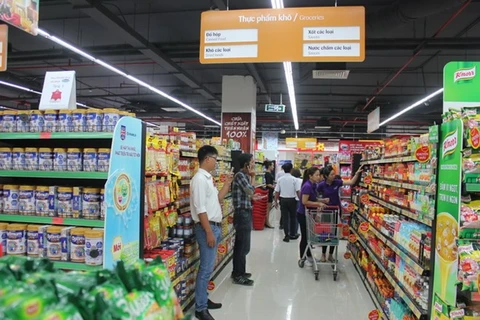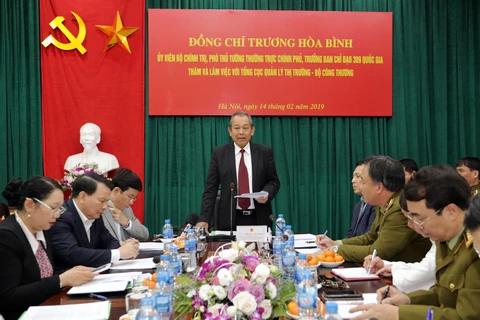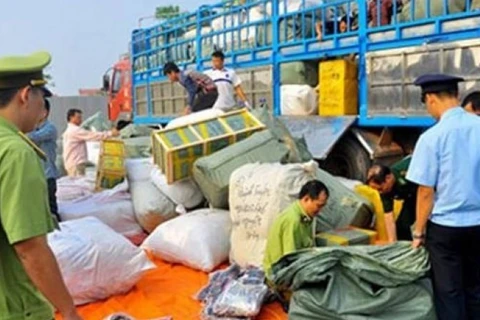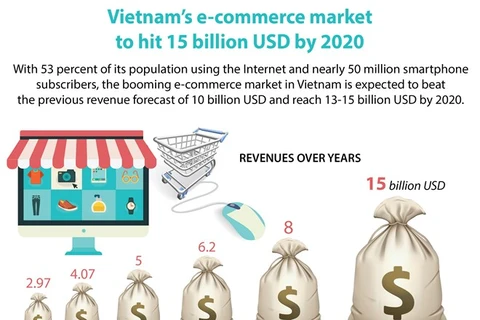 Deputy Minister of Industry and Trade Dang Hoang An talks about e-commerce at the workshop (Photo: VietnamPlus)
Deputy Minister of Industry and Trade Dang Hoang An talks about e-commerce at the workshop (Photo: VietnamPlus) Hanoi (VNA) – A workshop held in Hanoi on April 18 to discuss the protection of consumers in e-commerce amidst the fact that fake goods and intellectual property violations becoming more common with the spread of online shopping sites.
The event, organised by the Vietnam E-commerce and Information Technology Agency under the Ministry of Industry and Trade, pointed out that counterfeits, even banned goods, are sold almost publicly online, which is the reverse of e-commerce that has worried consumers when shopping online.
Counterfeits like a “cancer”
Statistics unveiled at the workshop show that in 2018, Vietnam recorded a growth rate of 30 percent in e-commerce, via which total retail sales exceeded 8 billion USD.
However, Deputy Minister of Industry and Trade Dang Hoang An noted that searching “Gucci fake 1” on the internet, a large number of results will be shown. He quoted billionaire Jack Ma, owner of e-commerce giant Alibaba, as calling counterfeit goods a “cancer”.
The official said if counterfeits are not controlled right from their sources, which are businesses, outcomes of the combat against fake goods will be very limited.
[Vietnam works to close loopholes in e-commerce]
An noted the issue of fake goods and violations of intellectual property rights has become more common with the spread of online shopping sites. Authorities handled more than 1.2 million violations of fake goods appearing online with total amount of 92 trillion VND since 2015.
The Government and the National Steering Committee for Smuggling, Trade Fraud and Counterfeited Goods (National Steering Committee 389) have taken drastic measures in resolving the issue.
However, he said, current shortcomings were partly due to the legal framework. The regulations on administrative punishments in e-commerce (Decree 52) were issued 6 years ago and have not been updated for this new business type. The current regulations require authorities to determine the transaction behaviour and physical money transfer to have a basis for handling. Meanwhile, goods sold on the e-commerce market are diversified. It is difficult to control transaction time and identify sellers and buyers as they could use a fake address and name.
The deputy minister added if the legal framework is not updated with stronger punishments, the issue cannot be resolved, causing State budget losses and affecting customers.
Echoing the view, Deputy Chief Inspector of the Ministry of Science and Technology Nguyen Nhu Quynh said the number of violations in e-commerce has increased considerably in the recent past.
Among the complaints sent to this agency last year alone, up 60 percent were about intellectual property infringements in e-commerce, she noted, adding that there remain many problems relevant to the control of counterfeit products and goods violating intellectual property rights on e-commerce platforms of some big businesses.
 Representatives of five big e-commerce platforms sign the commitment to preventing counterfeits in e-commerce (Photo: VietnamPlus)
Representatives of five big e-commerce platforms sign the commitment to preventing counterfeits in e-commerce (Photo: VietnamPlus) Strong actions needed to handle violations
Pointing out popular infringements in this field, General Director of the Vietnam Directorate of Market Surveillance Tran Huu Linh said they include unregistered shopping sites and products’ quality different from what is advertised.
He noted some delivery companies have unexpectedly become a tool for shipping smuggled goods, adding that by examining vehicles on roads, authorised forces have discovered a number of goods without legal invoices or papers delivered in this way.
Facing that fact, Linh urged the perfection of legal documents relevant to the fight against counterfeit products and intellectual property violations on the internet. One of his proposals is to increase administrative penalties as a deterrent to companies and individuals doing illegal business.
Nguyen Huu Tuan, head of the division for e-commerce management at the Vietnam E-commerce and Information Technology Agency, also suggested some solutions, including binding e-commerce platforms’ owners to the fight against fake items.
He added that his agency will also pay more attention to the examination and classification of e-commerce websites to create a better “filter” for the market.
In the time to come, the agency will develop a software for receiving complaints online and then, it will share information with authorities so as to deal with violations and give warning to consumers in a timely manner, Tuan said.
Also at the workshop, representatives from five major e-commerce platforms, namely Adayroi.com, Lazada.vn, Sendo.vn, Shopee.vn and Tiki.vn signed the commitment to saying no to counterfeit goods in e-commerce, which aims to demonstrate their sense of responsibility towards and resolve in the combat against counterfeit products.
They pledged to sell goods with assured quality and origin, not lend a hand to anyone taking advantage of e-commerce to sell fake goods or those violating intellectual property rights, and protect consumers’ interests, thereby helping with the sustainable development of e-commerce./.
























